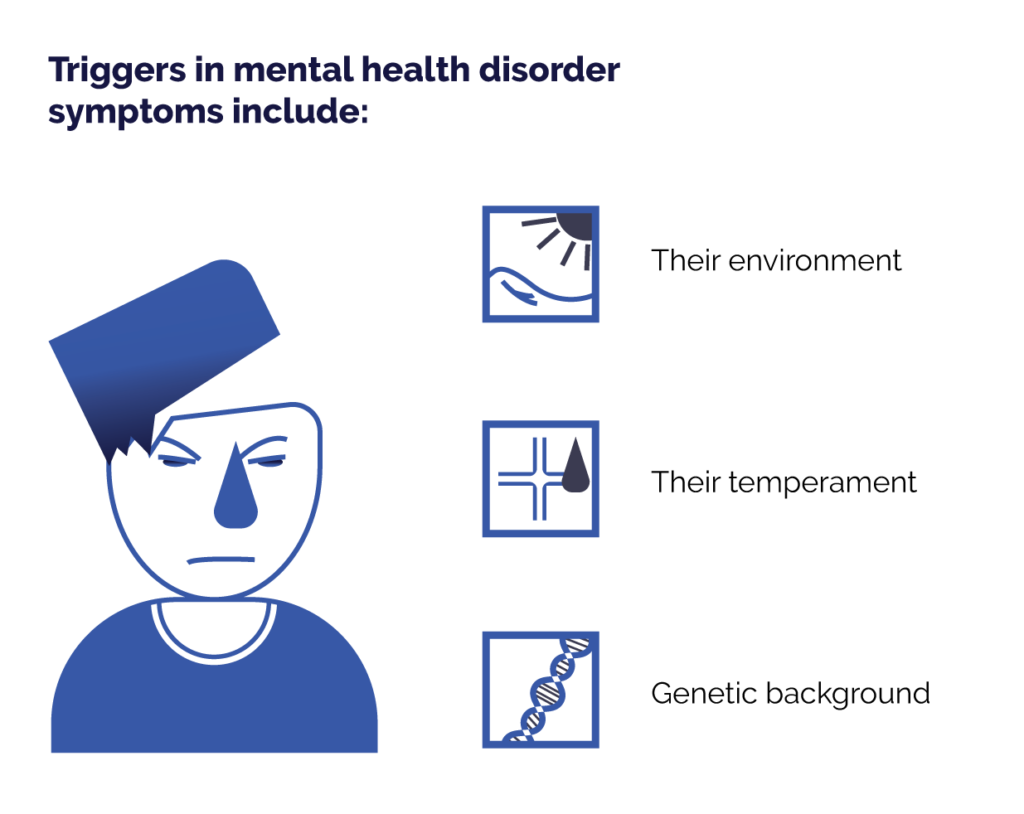Mental health problems are spreading fast among teens. During the last ten years, the number of adolescents reporting mental health challenges such as anxiety, depression, and stress-related disorders has surprisingly increased. The CDC reports that in the United States, about one in three adolescents has an anxiety disorder, while incidences of depression have drastically increased. Though the pandemic and the digital era have been used to explain these, the actual causes are even more difficult and multi-dimensional. Parents should, therefore, be able to understand these challenges, the warning signs, and how to support their teens through their mental health journey.
Understanding Mental Health Disorders in Teens
Adolescence is a time of rapid transformation; thus, the transition is quite chaotic for both the teenager and the family. In this developmental phase, teenagers go through various emotional, physical, and social changes. Mood swings, though natural for every growing child, are considered to be one of the indications of mental health disorders when these changes become extreme, persistent, and begin interfering with daily life.
Anxiety and Depression:
They are the most common of the mental health disorders to afflict teenagers. Anxiety Disorders: These include generalized anxiety disorder, social anxiety disorder, and panic disorders. Teens can show symptoms such as excessive worry, fear of social situations, or panic attacks. Depression: It is a mood disorder characterized by feelings of sadness, hopelessness, and a loss of interest in activities that were once enjoyed. Depression in teens can lead to irritability, isolation, and even self-harm or suicidal thoughts.
Eating Disorders:
The more prevalent ones are anorexia, bulimia, and binge eating, usually associated with distorted body images and pressures from society.
Attention Deficit Hyperactivity Disorder (ADHD):
It may be a disorder that involves poor attention, hyperactivity, and impulsivity; thus, it causes problems at school or within the social circle.
Self-harm and suicidal thoughts:
Many teenagers with mental disorders may also self-harm or voice suicidal thoughts; thus, parents need to know the warning signs to take action as early as possible.
The Factors Contributing to the Rise in Mental Health Issues Among Teens

There are numerous factors contributing to the increasing number of mental disorders among teenagers. Some of these include:
Social Media and Digital Pressures
Modern teenagers are never disconnected, and thereby teenagers are overloaded with information; they are bombarded with idealized images of life. The demands to maintain a socially enviable virtual persona, coupled with a relentless pursuit of self-worth through likes and comments, may seriously stress the mental capabilities of a teenager. The evidence does unmistakably indicate that high levels of social media use in any given population are accompanied by high levels of anxiety, depression, and loneliness.
Cyberbullying has also become rampant, wherein hurtful remarks and exclusion take place on sites where teenagers spend most of their time. The constant bombardment of negative interactions affects self-esteem to a great degree and can worsen anxiety and depression.
Academic Pressure and Performance Anxiety
The contemporary educational scene has mostly been known to place a heavy burden of expectation on the performance of teenagers. Fear of failure, together with pressure for performance at everything, including grades and extracurricular activities, leads to tremendous stress and anxiety. For teens, fears about prospects later in life and not meeting up to expectations, both their own and those expected by parents and teachers, will cause stress.
Various factors can include family issues—divorce, financial instability, or an unhealthy home environment tend to affect a teenager’s mental health tremendously. For teens dealing with stressors in their families, a lot of times an unstable atmosphere might come out of this. Anxiety, depression, and even anger are great examples of instability factors. In addition, communication or understanding between parents and teenagers may be additional contributing factors to feelings of isolation that can worsen mental health issues.
Global Events and Societal Concerns
Recent years have been forged in the fire of some pretty monumental events: the COVID-19 pandemic, social justice movements, and global uncertainty. It is no secret that these events—most notably the pandemic brought financial stress, close or complete school closure, and social isolation onto students, which in turn has taken a lingering toll on their mental health. Teens can be plagued by uncertainties about their future, the environment, or fear of the world around them, adding to mental health burdens.
It would also therefore tend to run in families genetically. Hormonal changes, especially during adolescence, can further affect mood and emotional regulation. Teens are, therefore, at a higher chance of experiencing mental health challenges if their families have a history of mental health problems. In addition, alterations in the development of the brain, particularly those areas connected with decision-making and emotional regulation, may also account for why some teenagers experience mental health difficulties.

Warning Signs of Mental Health Disorders in Teens
Being aware of warning signs of mental health disorders in teenagers is very important to provide timely interventions. Some of the general warning signs that must be taken into consideration by the parents include:
Changes in Behaviour:
Withdrawing from family or social activities, changes in eating or sleeping patterns, or a sharp decline in school performance are indicative signs of an underlying problem.
Excessive Moodiness:
While it is true that mood swings during adolescence are normal, gross changes in mood, such as excessive depression, irritability, or anger, may indicate depression or some other disorder.
Physical Complaints:
Frequent headaches, stomachaches, or other unexplained physical problems may be the physical manifestations of stress or anxiety.
Substance Abuse:
The use of alcohol or drugs can be both a cry for help and a negative coping mechanism for teenagers dealing with mental health issues.
Self-Harm or Suicidal Thoughts:
If a teenager mentions thoughts of suicide, self-harm, or harming others, or if they self-injure themselves through cuttings or other methods, seek immediate help.
What Parents Can Do to Help Their Teenagers

Parents are a valuable asset to their teenagers for maintaining good mental health. Here are some ways parents can support their teenager:
Effective Communication
One of the most important things parents can do is provide a sounding board for their teenagers to feel free expressing themselves without fear or anxiety. Keep the lines of communication open, and listen in a non-judgmental manner. Sometimes, ask them how they feel and what is bothering them rather than pressing for details. Validate their feelings and remind them they are not alone.
Seek Professional Help
If you suspect that your teenager is suffering from a mental health disorder, professional help becomes necessary. A licensed therapist, counselor, or psychiatrist can advise and help your teenager build coping methods. Cognitive behavioral therapy, for instance, is usually very effective in treating anxiety and depression. In some instances, medication might also be administered to manage symptoms.
Encourage Healthy Habits
Encourage healthy habits in your teen, including regular exercise, a healthy diet, and adequate sleep. Such basic self-care can greatly affect mood and mental well-being. Foster activities your teenager is interested in, and minimize stressors if possible.
Monitor Social Media
Since social media is often the leading source of stress for teens, help your teenager set healthy limits to their screen time. Encourage face-to-face relationships and make sure your teenager uses social media positively and in a balanced way. Be proactive and discuss the prevention of online safety and the risk for cyberbullying.
Be Supportive, Not Overbearing
While involvement in your teenager’s life is important, it’s equally important to give them their space and allow them independence where needed. Never be over-controlling or belittling of a teenager’s problems. Be a supportive figure that will help encourage them to seek support when needed.
Conclusion
The increasing cases of mental health disorders among teenagers are an emerging concern, yet with support, understanding, and timely intervention, teenagers can be able to get through all those challenges and live fulfilling lives. Parents need to keep themselves updated about mental health issues, observe the warning signs in their teens, and should be proactive in supporting their teen. You can enable your teenager to deal with this period in their life with confidence and resilience by encouraging open communication, helping them maintain good habits, and seeking professional advice where needed.